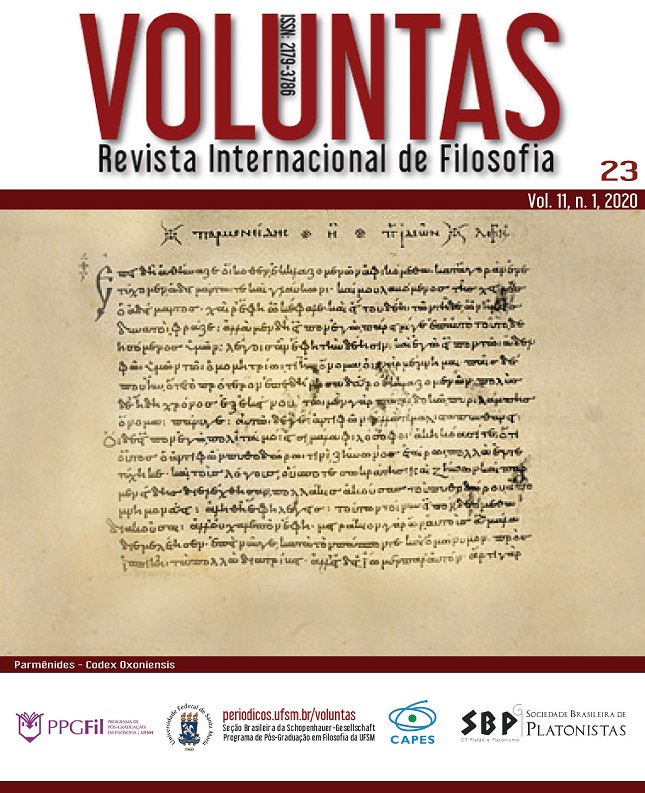Comments on Plato’s “Parmenides”
DOI:
https://doi.org/10.5902/2179378643308Schlagworte:
Plato, Parmenides, PrologueAbstract
This paper deals with some questions at Parmenides’ prologue that generally go unnoticed, despite their significance to understand the architecture of the Dialogue. There must be some meaning, for example, in the fact of Plato having brought into the Dialogue Cephalus of Clazomenae (in Ionia), who came to Athens to see Antiphon and hear from him Pythodorus’ report on what Parmenides and Zeno, both coming from Eleia (in Magna Greece), talked with Socrates in Athens. Clazomenae is the land of Anaxagoras, who, invitated by Pericles, founded a philosophical school in Athens. The debate between Parmenides, Zeno, and Socrates that took place at Pythodorus’ house was, for the first time, written by heart by Pythodorus himself, and then passed on to Antiphon (Plato's brother on his mother's side), who, by his turn, transmitted the report to Cephalus who ended up being the reporter of the Dialogue, in place of Plato's brother. Therefore, a flow of characters and regions makes up the Dialogue. There still is something unusual: Zeno, before Socrates and his companions at Pythodorus’ house, read his “writings”, of which, in the end, Socrates asked Zeno to re-read only “the first argument”: that one about the One and Many paradox, which is the theme of the debate and the construction of the Dialogue. This paper develops three stages: it comments the prologue of the Dialogue, outlines the treatment of the One and Many problem, and presents some possibilities of reading and interpreting the Parmenides.Downloads
Literaturhinweise
ALLEN, R. E. Plato. Parmenides. Minneapolis: University of Minnesota Press, 1983.
BAILLY, A. Dictionnaire Grec Français. Édition revue par L. Séchan et P. Chantraine. Paris: Hachette, 1996.
BARNES, J. Aristotle. The Complete Works of Aristotle. The Revised Oxford Translation, Princeton: Princeton University Press, 1984.
BURNET, J. Plato. Platonis Opera. 5 vols. T.I tetralogias I-II continens [insunt Euthyphro, Apologia, Crito, Phaedo, Cratylus, Theaetetus, Sophista, Politicus], recognoverunt brevique adnotatione critica instruxerunt W.A. Duke, W.F. Hicken, W.S.M. Nicoll, D.B. Robinson et J.C.G. Strachan. Oxford:
Clarendon Press, 1995.
BOLZANI FILHO, R. “Glauco, o guardião do lógos”. Revista Dois Pontos, São Carlos/Curitiba, v. 10, n. 2, 2013, pp.11-32;
CLEMENE DE ALEXANDRIA. Les Stromates. Introduction par Claude Mondésert, traduction et notes de Marcel Caster. Paris: CERF, 2006.
CROMBIE, I. An Examination of Plato’s Doctrines. Vol. II: Plato on Knowledge and Reality. London: Routledge, 1963.
DIELS, H. & KRANZ, W. Die Fragmente der Vorsokratiker. l8ª ed., Zürich-Hildesheim: Weidmann, 1989.
DÜRING, I. Aristotele. Traduzione di Pierluigi Donini. Milano: Mursia, 1966.
IGLÉSIAS, M. & RODRIGUES. F. Platão. Parmênides. Rio de Janeiro/São Paulo: PUC/Loyola, 2003.
LIDDELL, H. G., SCOTT, R. & JONES, H. S. (1990). A greek-english lexicon. Revised Edition by H. Stuart-Jones. Oxford: Clarendon Press, 1968.
MOTTA, G. D. “Gláucon, Adimanto e a necessidade da filosofia”, Revista Kléos, n. 9/10, 2005/6, pp. 87-113;
NIETZSCHE, F. A Filosofia na Idade Trágica dos Gregos. Trad. Maria Inês Madeira de Andrade. Lisboa: Edições 70, 1987.
NUNES. C. A.. Platão. Parmênides. Belém: Universidade Federal do Pará, 1974.
NUNES, C. A. Platão. Diálogos. Cartas. Belém: Universidade Federal do Pará, 1975.
PAUSÂNIAS. Descripción de Grecia. Trad. María Cruz Herrero Ingelmo. Madrid: Gredos, 1994.
PLOCLO. Commentaire sur le ‘Parménide’ de Platon. Traduction de Guilhaume de Moerbeke. 2 vols., Édition Critique par Carlos STEEL. Lieden: Brill, 1981.
PLUTARCO. Vidas Paralelas. Vol. I: Teseo-Rómulo, Licurgo-Numa; Trad. Aurelio Pérez Jiménes, Madrid: Gredos, 1985.
PLUTARCO. Vies. Périclè-Fabius Maximus. Alcibiade-Coriolan. Tome III. Texte établi et traduit par Robert Flacelière, Émile Chambry et Marcel Juneaux. Paris: Les Belles Lettres, 2012.
REALE, G. Diogene Laerzio. Vite e dottrine dei più celebri filosofi. Testo greco a fronte, con la collaborazione di Giuseppe Girgenti e Ilaria Ramelli. Milano: Bompiani, 2005.
SPINELLI, M. Ética e Política: a edificação do éthos cívico da paideia grega. São Paulo: Loyola, 2017.
SPINELLI, M. Questões Fundamentais da Filosofia Grega, São Paulo: Loyola, 2006.
SPINELLI, M. Herança Grega dos Filósofos Medievais. São Paulo: Hucitec, 2013.
TUÑÓN, O. G. Xenofonte. Helénicas. Introducción, traducción y notas. Asesor para la sessión griega Carlos García Gual. Madrid: Gredos, 1994.
TUCÍDIDES. História da Guerra do Peloponeso. Trad. João José Torres Esbarranch. Madrid: Gredos, 1990.
VOILQUIN, J. Aristotele. Éthique à Nicomaque, texte établi et traduit. Paris: Garnier, 1961.
YEBRA, V.G. Aristoteles. Metafísica. Edição trilingüe. Madrid: Gredos, 1982.
Veröffentlicht
Zitationsvorschlag
Ausgabe
Rubrik
Lizenz
Die Einreichung von Originalen an diese Zeitschrift impliziert seitens der Autoren die Übertragung der Rechte zur gedruckten und digitalen Veröffentlichung. Die Urheberrechte für die publizierten Artikel liegen beim Autor, wobei der Zeitschrift das Recht zur Erstveröffentlicheng zukommt. Die Autoren dürfen dieselben Resultate in anderen Publikationen verwenden, wenn sie deutlich auf unsere Zeitschrift als ursprüngliches Publikationsmedium hinweisen.
Lizenz
Creative Commons Namensnennung - Nicht-kommerziell - Weitergabe unter gleichen Bedingungen 4.0 International (CC BY-NC-SA 4.0).






